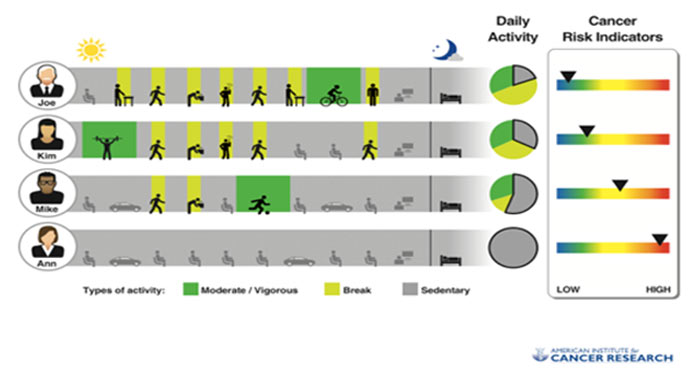Once you have completed your 24-hour self-reflection activity, think more specifically about your movement time. What type of movement did you do? What was the intensity and intentionality of that movement?
Over the past few decades, Americans have heard over and over that a minimum of 30 minutes of daily exercise is essential to good health. However, the latest research suggests that how much time we spend sitting could be just as important as how much time we spend exercising. In fact, a new term has been coined to describe those who exercise but spend the majority of their days being sedentary: active couch potatoes.
While the term couch potato usually refers to a lazy person who prefers to just sit around and watch TV, an active couch potato refers to someone who is inactive for the majority of the day, but regularly makes sure to get in 30 minutes of exercise on most days. An active couch potato is not necessarily lazy, but spends most of his or her time sitting during leisure time, work (and commuting to and from work), and while eating meals. In other words, they’re almost completely physically inactive throughout the day, with the exception of that 30 or minutes of daily exercise. Although 30 minutes of exercise is absolutely beneficial and healthful, the rest of the day is causing tremendous health hazards. In fact, the World Health Organization (WHO) has identified physical inactivity as an independent risk factor for chronic disease development, and it is now the fourth leading cause of death worldwide.
So, exactly how do we differentiate between exercise and being physically active? And is the distinction important? Here are some definitions that should help clear things up:
Physical activity is a movement that is carried out by the skeletal muscles that require energy. In other words, any movement one does is actually physical activity.
Exercise, however, is planned, a structured, repetitive, and intentional movement intended to improve or maintain physical fitness. Exercise is a subcategory of physical activity.
Research provides significant evidence that ALL physical activity positively contributes to overall health and well-being. Exercise also assists with the improvement of physical fitness, which consists of five specific components:
-Cardiorespiratory fitness
-Muscular strength fitness
-Muscular endurance fitness
-Flexibility fitness
-Body composition



